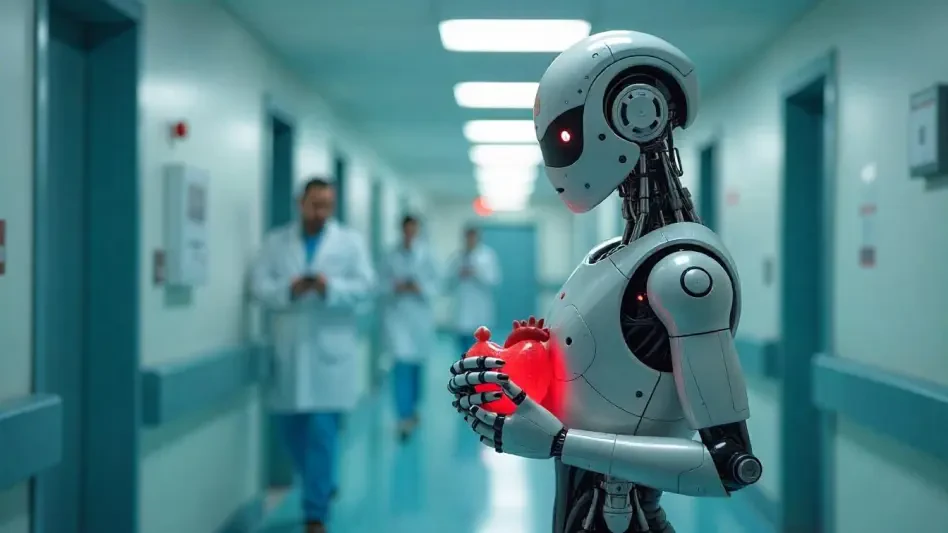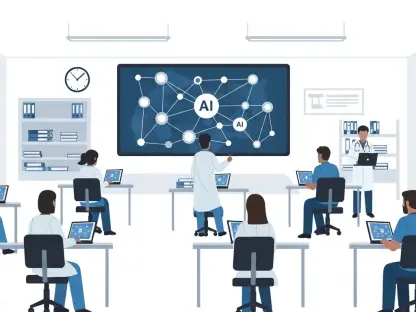In the evolving landscape of healthcare, Singapore introduces a revolutionary approach that aims to tackle one of the leading causes of mortality among its senior population: cardiovascular disease. This significant health challenge, responsible for nearly one-third of all deaths, underscores the urgency for innovative preventive measures. The Cardiovascular Ageing and Longevity Programme (Crane) emerges as a beacon of hope, devised to enhance heart health in the elderly through the use of sophisticated artificial intelligence (AI) tools. Spearheaded by the National Heart Centre Singapore (NHCS), this initiative is poised to reach approximately 60,000 elderly patients annually, deploying cutting-edge technology over the next several years.
AI Tools Making Strides in Cardiac Health
3DGait: Detecting Early Frailty
3DGait is an AI tool central to the initiative, focusing on the early detection of frailty in seniors by analyzing posture and movement. This tool recognizes subtle changes in a person’s gait that may indicate pre-frailty—a condition linked to increased risks of heart disease. By identifying these early signs, 3DGait allows for timely intervention, potentially averting serious cardiovascular complications. The relationship between frailty and heart disease is well-documented; decreased muscle strength and balance can hint at underlying cardiovascular issues. The significance of identifying pre-frailty lies in its potential to inspire preventive measures, encouraging physical activity and tailored medical strategies aimed at strengthening the cardiovascular system prior to the onset of severe disease.
3DGait’s capabilities extend beyond detection. By providing healthcare professionals with valuable patient data, this tool supports individualized treatment plans aimed at mitigating frailty-related cardiovascular risks. Such personalized interventions may include exercise regimes, dietary adjustments, or other lifestyle modifications that have a concrete impact on enhancing heart health. Ultimately, as an integral component of the Crane program, 3DGait empowers seniors to lead healthier, more active lives, while offering a proactive approach to addressing the challenges of aging.
Medi-Kiosk: Comprehensive Health Assessment
Complementing 3DGait is the Medi-Kiosk, another sophisticated AI-driven tool designed to assess a range of vital health metrics. This system measures conventional indicators like blood pressure and body mass index (BMI), yet it extends its analysis to encompass more complex evaluations. These include appraising skeletal muscle mass and visceral fat composition, crucial for identifying potential signs of heart failure, such as fluid retention. By capturing these nuanced metrics, Medi-Kiosk provides a comprehensive snapshot of the patient’s overall cardiovascular health, facilitating early identification of emerging health issues.
The availability of such detailed assessments enables healthcare providers to implement preventive measures tailored to each patient’s specific needs. Through a combination of regular monitoring and targeted interventions, Medi-Kiosk helps mitigate the risk of severe cardiovascular events. By integrating this tool into routine clinical practice, healthcare professionals can offer a higher standard of care. This approach demonstrates how technology not only aids in diagnosis and treatment but fundamentally shifts the focus from reactive to preventive care, emphasizing early intervention to curb the progression of cardiovascular disease in seniors.
Broader Implications for Research and Education
Advancing Clinical Research in Cardiology
Crane’s potential extends beyond immediate healthcare applications; it also acts as a catalyst for enhanced clinical research in cardiology. By focusing on the intricacies of cardiovascular aging, the program aims to unravel the underlying mechanisms that contribute to heart disease in seniors. One key aspect under investigation is how aging independently affects cardiovascular health, distinct from traditional lifestyle risk factors. By exploring how age-related changes to heart tissue and blood vessels impact disease development, researchers hope to derive new strategies for prevention and treatment specifically tailored to the aging population.
The Crane program also fosters research into geriatric cardio-oncology and regenerative medicines. Investigating the interaction between cancer treatments and heart health in older adults is crucial, given that many seniors often face multiple health challenges concurrently. Meanwhile, exploring regenerative treatments offers the promise of repairing or replacing damaged cardiovascular tissues, which could significantly improve the quality of life for older patients. With these focused research endeavors, Crane not only seeks to improve individual patient outcomes but also aspires to set new standards in geriatric cardiovascular care globally.
Educational Initiatives and Knowledge Dissemination
An equally important element of the Crane initiative is its emphasis on education and knowledge dissemination. By training healthcare professionals in the latest AI-driven tools and techniques, the program aims to enhance the quality of care available to seniors. Leading the charge in geriatric cardiology education, the NHCS is uniquely positioned to influence healthcare practices across the region, promoting an understanding of AI’s potential to transform cardiovascular health management. This comprehensive educational approach ensures that the benefits of advanced technology and research are effectively translated into everyday clinical settings.
Furthermore, the Crane program engages directly with patients, offering educational resources and support aimed at fostering awareness and understanding of heart health among seniors. By empowering patients with knowledge, the program encourages proactive health management and reinforces the importance of lifestyle choices in long-term heart health. Through these multifaceted educational initiatives, Crane not only seeks to elevate the professional practice of geriatric cardiology but also aspires to cultivate a culture of preventive healthcare within the community.
Innovative Pathways to a Healthier Future
Singapore’s healthcare system is embracing a groundbreaking approach in response to a pressing health concern among seniors: cardiovascular disease. This ailment, responsible for nearly one-third of all fatalities in the older demographic, necessitates urgent, innovative preventive solutions. The Cardiovascular Ageing and Longevity Programme, known as Crane, represents a significant stride forward, aiming to bolster heart health among the elderly by leveraging advanced artificial intelligence (AI) technologies. The National Heart Centre Singapore (NHCS) is spearheading this initiative, which plans to impact around 60,000 senior patients annually, using sophisticated technology. Over the coming years, this program will harness AI’s capabilities to fine-tune prevention measures, aspiring to reduce the mortality rate associated with cardiovascular illnesses. Crane exemplifies a visionary strategy, marking a promising path in medical care for Singapore’s aging population.









